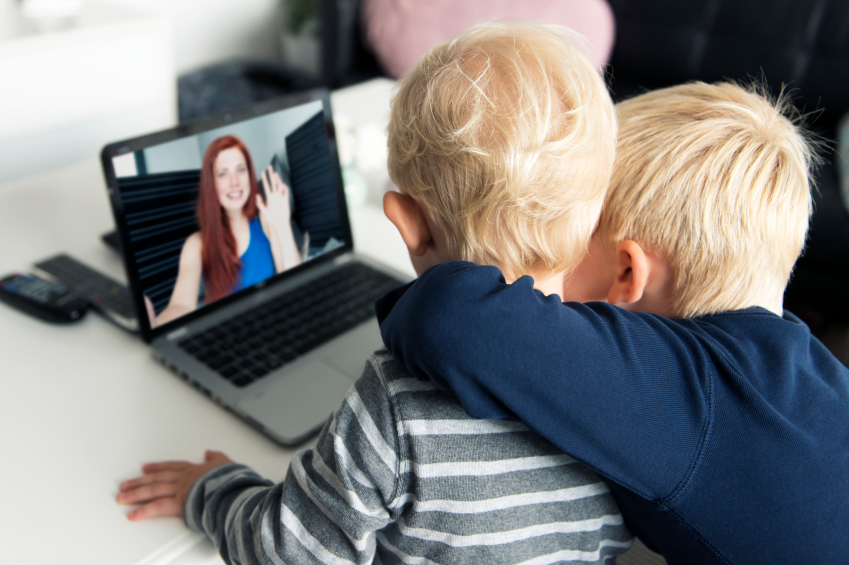“Is Daddy coming home tonight?” my daughter often asks.
She usually chooses to loudly ask this question at the worst possible time – when we’re in a crowded location like a mall or grocery store – the kind of places that elicit stares as people wonder why a four year-old would have to ask whether or not her father will be coming home. Divorce? Affair? CIA agent involved in black ops?
It’s not any of those exciting, gossip-worthy scenarios though. My husband’s job working in the sports industry calls for him to work late into the evening on a regular basis. He’s usually home by 10 o’clock or so on those nights, but given my daughter’s 7pm bedtime, it may as well be midnight or later. She sees him for about two hours in the morning before we all depart for the day, but that is the most “face time” that they have with each other on many days.
Except when they FaceTime.
Both my four year-old and her three year-old brother periodically speak to their daddy either through my laptop or my phone via FaceTime. It is a way to share how their days have been, to make silly faces at each other, to say “goodnight,” and to just generally connect when doing so in person is impossible. Rather than only seeing their father for the brief and hectic time while everyone is trying to head out the door, they are able to interact and bond with him through technology. They’re comfortable with FaceTime, and it’s “user friendly,” even for a preschooler.
They have a similar experience and a wonderful time over Skype with their grandparents. Two nights ago, my daughter “read” a book to my mother-in-law and they sang “Twinkle Twinkle Little Star” – with the accompanying hand gestures of twinkling stars – together. The richness of these interactions would have been significantly undermined had they been on the phone where facial expressions are impossible, and animated conversations with a preschooler (beyond monosyllabic responses) can prove difficult. Even my Special Needs son was able to have a positive interaction with his grandparents – smiling and giggling as his grandmother and grandfather indulged him by clapping along as he sang “Ooh Ah” to them (it’s an original, and a bit repetitive, but the words are a cinch to memorize). It’s a connection that, due to his cognitive and language delays, would not have happened without this visual, interactive aspect of their conversation.
So much is said about how much technology is ruining face-to-face relationships and interactions in these modern times where seemingly everyone’s face is buried in a screen, but very little is said about what benefit is gained when there is another face smiling back at you on that screen. With parents travelling for business or grandparents that live two thousand miles away (or more), technology affords them the priceless opportunity to build these connections, and strengthen relationships that may otherwise be weakened by time and distance. So many of my friends who had relatives that lived far away hardly knew them. Often Grandma and Grandpa were people they saw twice a year – and therefore, unfortunately ended up becoming more conceptual relationships rather than people to whom they felt emotionally attached to. Aunts and uncles felt like strangers, and seeing cousins on visits or over the holidays seemed like little more than uncomfortable play dates.
Programs like Skype and FaceTime have changed that. I “tucked” my children in via FaceTime from a conference I recently attended in Chicago and they have Skyped with cousins they have yet to meet in London – these are experiences I never had as a child. Relatives that I was unable to see more than a few times a year were those that I automatically wasn’t as close to. In these days of families with two working parents, longer hours on the job, a higher rate of divorce than ever, and extended families that are spread out across the country, why isn’t more attention being paid to ways in which these relationships are fostered, sustained, and nurtured with the assistance of modern technology?
How have apps like FaceTime and Skype affected your children’s relationship with their family and friends?
Jamie Krug is a writer and stay-at-home-mom with a full-time job as the CMO (Chief Medical Officer) of her family as well as a Huffington Post Contributor. She is the mother to an inquisitive daughter, Parker; and the mischievous-grinned Owen.
Her blog www.OurStrokeOfLuck.net tells the story of her family’s day-to-day struggles and triumphs in the wake of the devastating and still largely misunderstood rare diagnosis her son received at birth.
She prides (embarrasses?) herself by stating out loud what other mothers may feel but wouldn’t dare say…
You can follow Jamie on Facebook, Instagram, and Twitter.














Leave A Comment
You must be logged in to post a comment.